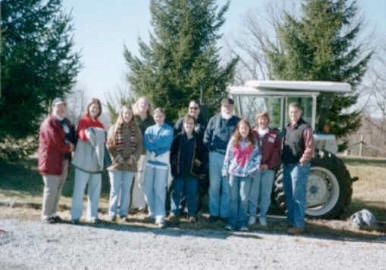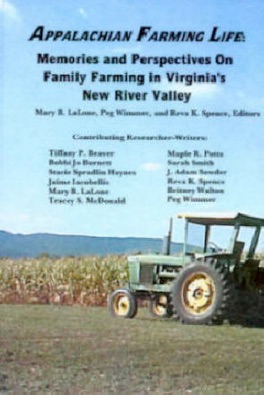Photo above: Spring 2002 Research Team during a project orientation with Farm Bureau members Bob and Charlotte Holland, at the Holland's Lazy H Farm.
Radford University Project Director/Professor: Dr. Mary LaLone
Project Research Assistant: Peg Wimmer
Spring 2002 Student Research Team:
Tiffany Beaver, Bobbi Jo Burnett, Jaime Iacobellis, Tracey McDonald, Maple Potts, Sarah Smith, Adam Sowder,
Britney Walton, & Peg Wimmer
Fall 2002 Student Research Team:
Tiffany Beaver, Jaime Iacobellis, Tracey McDonald, Maple Potts, Kay Spence, & Peg Wimmer
For Further Reading about the Appalachian Farm Project, see:
LaLone, Mary B.
2005 "An Anthro-Planning Approach to Local Heritage Tourism: Case Studies from Appalachia." NAPA Bulletin (National Association for the Practice of Anthropology), Vol. 23:135-150.
2005 "Building Heritage Partnerships: Working Together for Heritage Preservation and Local Tourism in Appalachia. Practicing Anthropology 27(4):10-13.
2007 "New River Valley Farming Oral History Project." IN Case Studies in Community-Based Collaborative Research, The Institute for Community Research, June 2007, web publication http:///www.incommunityresearch.org/documents/CaseStudiesinCBCRFinal12.17.08.pdf. Pp. 13-16.
2009 "Guidelines for a Partnership Approach to Appalachian Community and Heritage Preservation Work." IN Participatory Development in Appalachia: Cultural Identity, Community, and Sustainability, Susan E. Keefe, ed. Knoxville: University of Tennessee Press. Pp. 201-229.
2010 “Running the Family Farm: Accommodation and Adaptation in an Appalachian Region.” Journal of Appalachian Studies 14(1-2):62-98.
2014 “Farming Life in the New River Valley of Virginia: Ten Important Features Learned Through the NRV Farming Study.” Journal of the New River Historical Society 26: 6-33.





